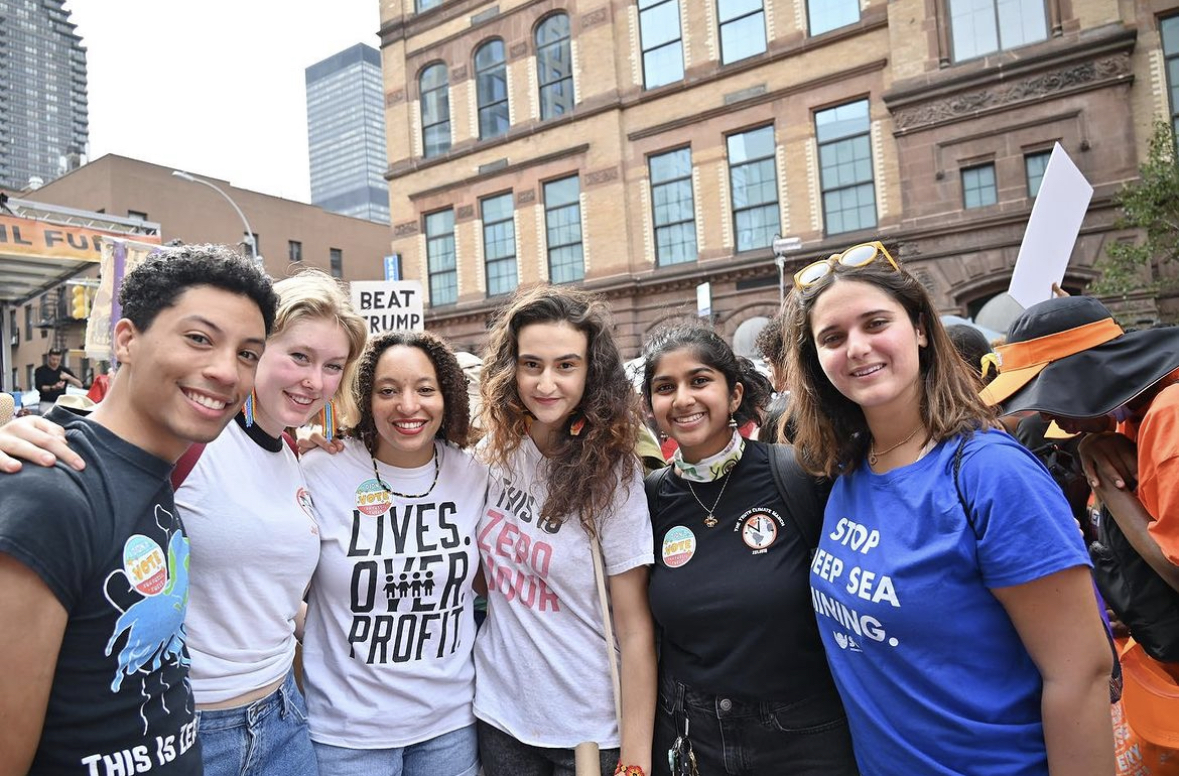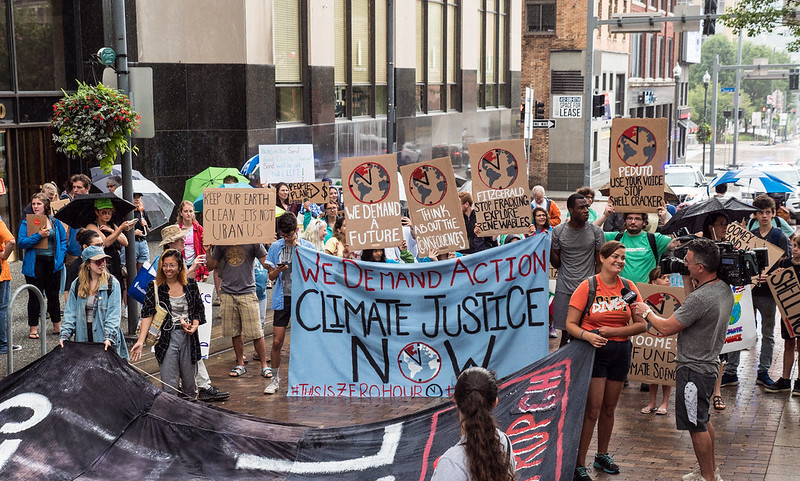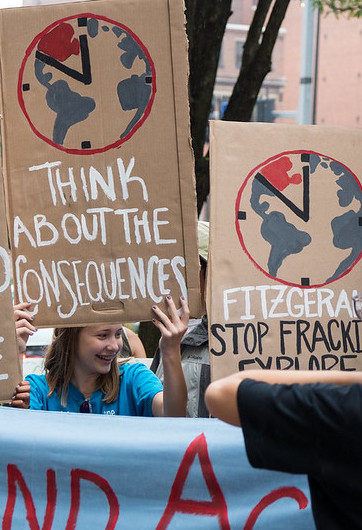
Image courtesy Stina Trollbäck

Image courtesy Stina Trollbäck
The Deepwater Horizon Oil Spill of 2010 is Amelia Southern-Uribe’s first memory of climate-related anxiety. Growing up in the South, the effects of climate change were not foreign to them, but they were frightening.
“I had these immense feelings of anxiety and worry and frustration toward the climate, I guess, because I didn’t know how to verbalize these things at such a young age, but I just remember being very scared,” Southern-Uribe said.
By 2019, Southern-Uribe had seen the tangible effects of climate change around the world. From devastating climate disasters to deep political divides, they began to feel trapped in the reality of the climate crisis, but knew their lived experiences and fears could be used for the better.
That’s when they found Zero Hour, a budding youth-climate organization based in the Metro DC area that had mobilized young people across the world to take a stand against the worsening crisis.
Born of youthful frustration and passion, Zero Hour has been a force in the fight for climate justice. Jamie Margolin is at the root of the organization’s founding. At only 16, Margolin banded together with her soon-to-be co-founders Zanagee Artis, Nadia Nazar, and Madelaine Tew to produce the Youth Climate March in the summer of 2018. The march, which spanned across 25 different locations including Washington, D.C, was Zero Hour’s first official demonstration.

Following the march, Margolin, Artis, Nazar, and Tew realized their work to gather the younger generation was not something done in vain. They began to work toward environmental education, leading a program called “Getting to the Roots of Climate Change.”
The program taught prospective members about systems of oppression, including patriarchy, capitalism, colonialism, and racism, as “root causes” of climate change, according to Artis, who was 17 when they created Zero Hour.
Now 23, Artis said the focus in educating about fossil fuel policy has become the driving force in the organization’s work. He said that while organizing demonstrations and rallies such as the march in 2018 is important, education is the foundation for any form of resistance.
Southern-Uribe, who is now the director of southeastern chapters, and president and founder of Zero Hour Arkansas, said they discovered Margolin’s work with the organization through research and quickly found themself emboldened by her accomplishments. Southern-Uribe said they participated in the organization’s training program, ultimately leading to their decision to open the Arkansas chapter.
Southern-Uribe said the largest challenge in the fight against climate change is the lack of education surrounding the issue, especially in red states such as Arkansas. One initiative they have taken in the Arkansas chapter was creating a climate magazine called Roots, to help spread knowledge about the environmental crisis and the ways that it could affect communities who might be hesitant to believe in it.
“Arkansas ranks 47th in the nation for education,” Southern-Uribe said. “And so that’s what I mean when I say there are no conversations happening. There’s lots of climate change denial. And since there’s denial, there’s a lack of action.”
Aditi Lele, the research & policy communications lead for the organization, said the training program explaining the rooted relationship between climate change and systems of oppression was what truly struck a chord in her.
“It really matched the framing of how I conceptualized climate and how I wanted to pursue it,” Lele said. “I didn’t really want to work on climate from necessarily a conservation lens or just sort of addressing global warming as a whole, I really wanted to focus on how it was impacting people in communities and how it was a justice problem.”
Lele, who at 8-years-old moved from Pune, India, to Cincinnati, Ohio, said her identity as an immigrant informed a unique understanding of the effects of climate change.
“It centered my focus a lot on how climate was impacting people,” Lele said. “I was able to see monsoon seasons and extreme weather firsthand. And so I had a little bit more of a tangible connection to the more nebulous things we hear about climate.”
Lele, 20, said she developed anxiety about the climate when she was in high school. She said she felt overwhelmed by the pressure of the rapidly changing climate and a growing uncertainty of the future, ultimately leading her to seek avenues through which she could take action.
Since its founding, Zero Hour has led many campaigns and demonstrations including art festivals, lobby days, and rallies calling for the eradication of fossil fuel projects around the world. The organization now spans 15 countries on every continent, with 50 active chapters and more in the works.
Jamie Minden, the global organizing director for Zero Hour, said the organization’s largest campaign now is the fight against liquified natural gas (or LNG), otherwise known as fracked gas.
In 2021, the U.S. began operations to move away from its dependence on Russian fuel with U.S-sourced LNG following the start of the Russia-Ukraine War. While the gas emits less carbon than other fossil fuels, its main component is methane, a powerful greenhouse gas which can leak into the atmosphere from drilling, shipping, and distribution.
Minden said Zero Hour is creating an educational program that advocates for an immediate termination of LNG use. The ultimate goal: inspire more action.

“Hopefully, we’ll recruit people to take action in their local cities, or in their nations once they see the presentation and are galvanized to take action,” Minden said.
Minden, who began her environmental advocacy at 13 years old, said growing up in Mountain Lakes, California, was a constant reminder of the worsening conditions of climate change.
“I have literally never lived in a world without climate chaos,” Minden said.
This, according to Lele, is a common sentiment among young people today.
“There is so much fear around ‘what the world is going to look like when I grow up,’” Lele said. “’What is it going to look like when I’m my parents’ age? What is it going to look like when I am going to college, when I’m looking for a job, when I’m thinking about raising a family? What does all of that look like?’ I think that [fear] made it hard for young people to even conceptualize the rest of their lives.”
Artis said the only way this crisis can be stopped from worsening is if there is “bold climate action” and a total phase-out of fossil fuels. Though that seems daunting, Artis believes young people have the power to achieve that.
“I think over time we’ve seen how much young people can actually influence the political system from the outside,” Artis said. “I think expectations were that this group of young people were naive and inexperienced, but there are protests all around the world now. Young people are leading the climate movement everywhere.”
“We’re the ones we’ve been waiting for. And there is no other course that is going to save us. And we have the power to make a lot of change,” Artis said.